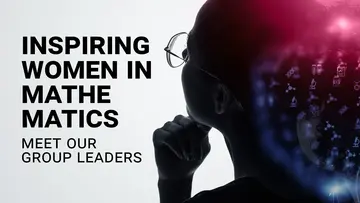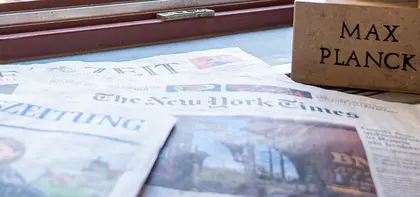
Jing An & Georgiana Chatzigeorgiou interviewed for International Day for Women in Mathematics
Published May 12, 2022
May 12 is the International Day of Women in Mathematics in honor of brilliant mathematician Maryam Mirzakhani. For this 4th edition, Jing An & Georgiana Chatzigeorgiou from Felix Otto's group offer some career insights as female mathematicians.
May 12, 1977, marked the birth of Maryam Mirzakhani, who was an Iranian mathematician and Professor of Mathematics at Stanford University. In 2014 she was the first woman to be awarded the Fields medal for her work on geometry and dynamical systems. Tragically, she passed away in 2017, but just one year later, the proposal to honor her achievements and her impact as a role model for mathematicians was realized. In this 4th year, there are more than 125 events and initiatives around the globe celebrating women and their achievements in mathematics and encouraging an open, welcoming, and inclusive professional atmosphere for everyone. Aside from offering a movie showing at the institute, we used the occasion to hear from two scientists and learn about their perspectives on being female mathematicians in a male-dominated research field.
Georgiana and Jing collaborate on a project on the study of convection-diffusion equations, which is of general interest in understanding many physical processes. They analyze these types of equations with Felix Otto from a stochastic homogenization perspective. In particular, they consider the enhanced diffusion in a 2-dimensional random environment driven by the curl of the Gaussian free field. Jing and Georgiana aim to capture its borderline super-diffusive behavior using PDE techniques.
Interview
MPI MiS: How did you get into math? What do you find particularly fascinating about this science? Why did you choose this particular field of research?
Jing: Although I was exposed to math competitions at a very young age, my genuine interest in working in math was established during my college years. The wonderful environment provided, including a world-class faculty and talented classmates, is inspiring and exciting. It makes me feel that math is the most valuable subject to study in my life. Math problems contain both pain and pleasure. One has to suffer from long stretches of pain when seeking a solution, but when the eureka moment comes, it also rewards you with incomparably great pleasure. I chose partial differential equations (PDEs) as my field of research because of a graduate PDE course I took in my senior year. Through the professor's fascinating instructions, that course instigated my curiosity to analyze the properties of PDEs to better understand their background sciences. Analyzing math with applications and using results to contribute to the real world is always the type of work I am most excited about and pursuing tirelessly.
Georgiana: I remember myself being excited with the math classes from a very young age, so when I had to decide what I would like to do in my life, I had no doubt that I wanted to study math. Solving a mathematical problem requires a delicate combination of a deep understanding of the existing mathematical theory with critical and analytical thinking. This is exactly what attracted my interest in becoming a researcher in math. The area which I found particularly attractive, as a student, was that of Mathematical Analysis. Therefore, as a researcher, I decided to focus on the (sub)area of Analysis of Partial Differential Equations (PDEs). The development of the rigorous mathematical analysis for problems governed by PDEs is crucial not only for completion of the mathematical theory, but also because PDEs are one of the most important links between maths and other sciences (physics, biology, finance, etc.).
MPI MiS: Did you ever doubt your abilities as a scientist? Why? How did you handle these situations/feelings?
Jing: It happened before. When I got stuck in a math problem for a long time, I would start to doubt myself, and it got worse, especially when my peers were making progress at the same time. Such anxieties and frustration are normal. Any career path has ups and downs. The most important thing is how to handle these situations wisely and not burn yourself out. My strategy is to put the long-standing problem aside for a moment, either to go out to nature for a short break or to work on a different problem. When your brain gets refreshed, you might find a different perspective to tackle the old problem you are bogged down with.
Georgiana: Being a researcher means that you have to deal with open problems and provide answers to questions that have never been answered before. It is quite apparent that things could not go as planned, and unexpected difficulties could often arise in the study of a new project. For that reason, failure is sometimes unavoidable, and that could make you doubt your skills and think pessimistically. Whenever that happens, I try to remind myself that, as a scientist, facing these difficulties is reasonable, and this is exactly what makes the job of a researcher particularly challenging and beautiful at the same time.
MPI MiS: Did you ever have the impression that it would've been easier/harder if you were male?
Jing: Perhaps my experience is biased, but I feel female mathematicians are still underrepresented in math society. Throughout my college and Ph.D. years, most people working in my field are male. This sometimes makes me feel frustrated when I look for a role model of the same gender. It might be easier for males to develop their math careers when connecting other male mathematicians with small talk. Females can do the same, but we have to adapt our thinking and communication strategy to the males' way.
Georgiana: Fortunately, I never had that feeling. The working environments I got involved in so far were equal-opportunity and supportive. I hope this is not just a coincidence and that all the academic institutions around the world would promote an atmosphere of inclusion. Nowadays, it should be unacceptable for an employer to form an opinion on a possible employee relying on their gender and not their skills and performance. I hope that in the near future we would see more and more young women becoming scientists and more experienced women holding high academic positions.
MPI MiS: What advice would you give young researchers starting out at the institute?
Jing: There are lots of resources at the institute, and one can also attend seminars and courses at the University of Leipzig. It is important to make full use of those resources. Another piece of advice is to talk to as many people as possible. Many visitors are coming to the institute all around the year, and talking to them can help broaden your view and meanwhile leave an impression on others.
MPI MiS: What are you looking forward to in the future?
Georgiana: I am looking forward to constantly enhancing my knowledge of mathematics and finding efficient ways to use this knowledge to contribute to the further development of mathematical theory. I am also looking forward to facing the new challenges of the questions that I plan to deal with in the future.
Scientific Contact
Jing An
Georgiana Chatzigeorgiou
Editorial Contact
Discover More
-
may12.womeninmaths.org
Website Women in Mathematics
Related Content
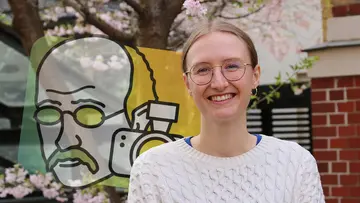
Elke Neuhaus Elke Neuhaus
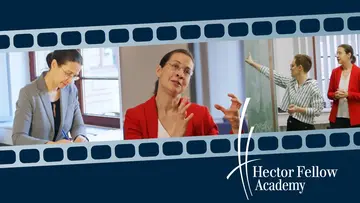
What School Doesn’t Teach Us About Mathematics What School Doesn’t Teach Us About Mathematics
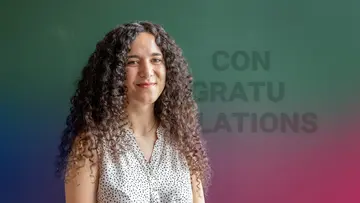
Young Talent Award for Laura Casabella Young Talent Award for Laura Casabella
